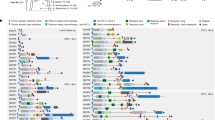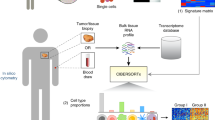Abstract
A novel tumor suppressor gene, PTEN/MMAC1, has been recently shown to be mutated in gliomas, breast, prostate, kidney cancers and melanomas. Loss-of-heterozygosity studies in melanoma have suggested the presence of at least one chromosome 10q locus lost early in tumor progression. In this study, we screened 45 melanoma cell lines and 17 paired uncultured metastatic melanoma and peripheral blood specimens for PTEN/MMAC1 alterations using PCR-SSCP and direct sequencing. We found nine melanoma cell lines with homozygous deletions (five with intragenic loss) and four cell lines with mutations (one nonsense and one frameshift; two intronic); from among our uncultured melanoma specimens, we found one tumor with a somatic 17 bp duplication in exon 7 leading to a premature stop codon and one tumor with a possible homozygous deletion. Furthermore, we have identified a novel intragenic polymorphism within intron 4 of PTEN/MMAC1. Taken together, these data suggest that PTEN/MMAC1 may be a chromosome 10q tumor suppressor important in melanoma tumor formation or progression.
This is a preview of subscription content, access via your institution
Access options
Subscribe to this journal
Receive 50 print issues and online access
$259.00 per year
only $5.18 per issue
Buy this article
- Purchase on Springer Link
- Instant access to full article PDF
Prices may be subject to local taxes which are calculated during checkout
Similar content being viewed by others
Author information
Authors and Affiliations
Rights and permissions
About this article
Cite this article
Tsao, H., Zhang, X., Benoit, E. et al. Identification of PTEN/MMAC1 alterations in uncultured melanomas and melanoma cell lines. Oncogene 16, 3397–3402 (1998). https://doi.org/10.1038/sj.onc.1201881
Received:
Revised:
Accepted:
Published:
Issue Date:
DOI: https://doi.org/10.1038/sj.onc.1201881
Keywords
This article is cited by
-
p-mTOR, p-ERK and PTEN Expression in Tumor Biopsies and Organoids as Predictive Biomarkers for Patients with HPV Negative Head and Neck Cancer
Head and Neck Pathology (2023)
-
PERK mediates resistance to BRAF inhibition in melanoma with impaired PTEN
npj Precision Oncology (2021)
-
AXL/AKT axis mediated-resistance to BRAF inhibitor depends on PTEN status in melanoma
Oncogene (2018)
-
Aberrant DNA methylation in melanoma: biomarker and therapeutic opportunities
Clinical Epigenetics (2017)
-
WNT/β-catenin signaling regulates mitochondrial activity to alter the oncogenic potential of melanoma in a PTEN-dependent manner
Oncogene (2017)



